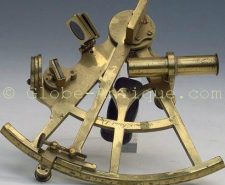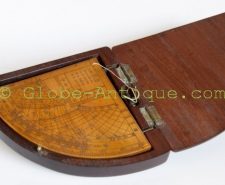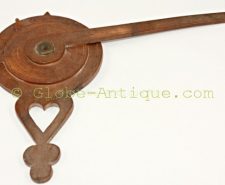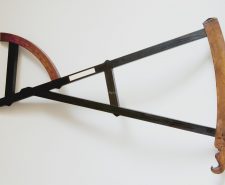- Mini Sextant Edward Nairne & Thomas Blunt London c.1780
- Antique Gunter’s quadrant 18th England
- Nocturlabe C1730
- Davis´s quadrant 18th England
Navigational instruments which have to withstand the rigours of sea voyages, particularly of salt sea-air, were formerly usually made of wood.
When the Portuguese, during the early fifteenth century, began to explore the coast of West Africa, it was initially by costal navigation. But when India was to be reached, instumental navigation became necessary.
The Portuguese Price, Henry the Navigator, founded a training workshop at Sagres for the officers. Here were brought mathematiciens and astronomers and cartographers to found the nautical science of navigation, to devise instruments, and draw up charts.
They were hardly suitable for elaborate decoration but very nice, and very few have survived as a result of the accidents of time. A study of them is consequently all the more interesting.
Antiques Le Saint Georges (www.globe-antique.com) Specialises in antique nautical instruments since more of 37 years, including early navigational instruments , octants, sextants, instruments of astronomy, navigation, surveying instruments, terrestrial globes, pocket travel globes, celestial globes, barometers, barographs, nautical compasses, sandglass, circles of reflection, telescopes, Backstaff, Davis quadrant , Gunter´s quadrant…
We have all the information about the item, biography of the maker, bibliography, references of museums.
The dossier of documentation will be submited with every object.
If you need more information, please contact us.




